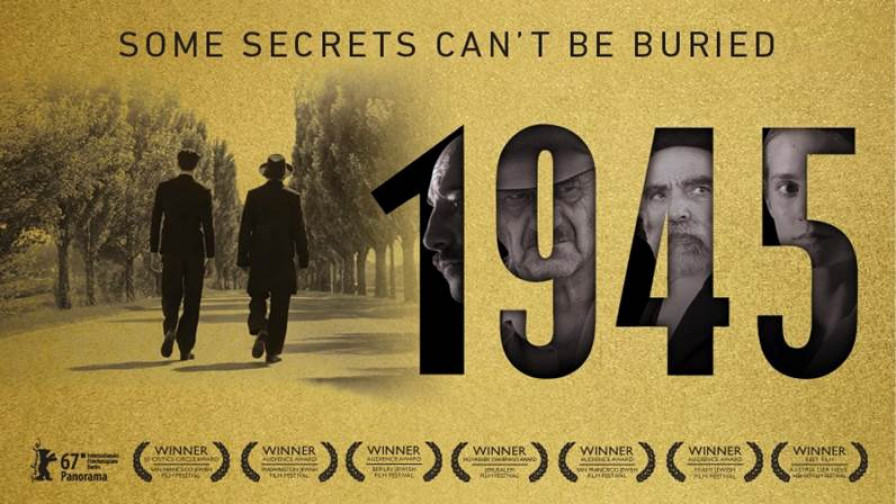'1945' Has a Successful Round in The US
On November 1, two New York cinemas featured Ferenc Török's widely-prized historical film, 1945, which has been praised by the US critics at the biggest American sites. 1945 will be shown in some additional New York cinemas, as well as in California at the end of November.
Ben Kenigsberg, from The New York Times, wrote that "lean, suggestive Hungarian feature, 1945 shot in gorgeous, high-contrast black-and-white... As the film slowly reveals how the village’s veneer of civility is built over a foundation of treachery, the darkened foregrounds suggest conspirators hiding in plain sight. Absorbing and finely wrought..." The Village Voice writer Danny King thinks that 1945 is a "Tense drama (...) boiling suspicions that power the plot." Kenneth Turan, the critic of Los Angeles Times, speaks admiringly as well: "Simple, powerful, made with conviction and skill (...) is a potent messenger about a time that is gone but whose issues and difficulties are not even close to being past."
Michael Sragow, the author of Film Comment, compares 1945 to Western films and thrillers: "With its canny use of evocative visual tropes like weathered men waiting at a rickety depot in a parched, flat landscape, the film has been compared to Westerns like High Noon, 3:10 to Yuma, and Once Upon a Time in the West. But it’s even closer to thrillers that reveal the tainted hearts of ingrown or claustrophobic neighborhoods." Jonathan Mark, from The New York Jewish Week, thinks that "luxurious cinematography reminiscent of Terrence Malick", as well as J.B. Spins, who wrote that "Thanks to Elemer Ragalyi’s stunning black-and-white cinematography, 1945 looks like it could pass for an epilogue to Schindler’s List. Török masterfully controls the atmosphere, forcing viewers to share the stifling hush that has enveloped the village."

1945 by Ferenc Török
Doris Toumarkine, from Film Journal, also thinks that „This film itself is a perfect storm of realistic immersion, including the fine black-and-white cinematography, rich production design and excellent ensemble performances.” Linda Cook, the author of Quad City Times, also praises the cast: „The performances are wonderful all around. They are so realistic that, because of the black-and-white format, you might feel as though you’re watching a documentary at times.”
„A powerful parable of Biblical proportions, illustrating both man’s inhumanity to man, as well as his capacity to forgive, if not necessarily to forget.” - says Kam Williams from The Missisipi Link. Nora Lee Mandel, Maven's Nest, also thinks that „1945 is a dramatically suspenseful, beautiful-looking, scarily evocative step back into that precarious year.” Roger Costa, from Enternainment For a Living, praises the direction: „prolific Hungarian filmmaker Ferenc Török brilliantly manipulates the viewer with continuous twists in this intensely crafted and suspenseful depiction of a community stirred up by buried secrets and the remains of war.” Shock Ya!'s author, Harvey Karten, wrote that 1945 „is targeted to cinema buffs who do not require fast action but often prefer a meditative, thoughtful, deeply-felt story.” „This is a unique film that clearly is among the year’s best and not to be missed.” - wrote William Wolf, from the Wolf Entertainment Guide.

1945 takes place on the shimmering heat of a summer’s day in rural Hungary in August 1945. A kind of torpor envelops the village. The drug store owner is getting ready for his son’s wedding, the signalman is changing the points at the station, and the coach driver is waiting for customers. Two strange men descend from the train, clad in black. They are father and son; survivors of the Holocaust. They walk in silence behind a waggon on which they are transporting two boxes. Rumours spread like wildfire through the village. Do the boxes contain powder, perfume and soap, and are these men going to compete with the local chemist shop? Are they relatives of the former shop owner, a Jew who was first denounced and then deported? Fear soon spreads throughout the community, for many of them were involved in the crimes of the recent past – whether it be betrayal, silence or theft. Things that were almost forgotten now come to the fore with a vengeance. The past is not dead. It has not even passed. Ferenc Török’s film is a non-folkloristic depiction of the interconnection between crime and punishment, presented in sharply contoured black-and-white photography. A Hungarian village becomes a mirror for the failure of an entire society.
The adaptation of the novel by Gábor T. Szántó has a very strong cast: Péter Rudolf, Bence Tasnádi, Tamás Szabó Kimmel, Dóra Sztarenki, Iván Angelus, Marcell Nagy, Ági Szirtes, József Szarvas, István Znamenák and Eszter Nagy-Kálózy are in the main roles. The screenplay was written by Gábor T. Szántó along with the director, Ferenc Török, the director of photography was Elemér Ragályi, and the composer was Tibor Szemző. 1945 was made with the support of the Hungarian National Film Fund and the Claims Conference, in the production of Katapult Film.
1945 earned several awards since its festival premiere in January, 2017. It became the audience's favourite and won Audience Awards at the Miami Jewish Festival, the Berlinale, the Chattanooga Jewish Film Series, the San Francisco Jewish Festival, and the Vienna Jewish Film Week. It earned the Best Narrative Fiction at Washington Jewish Film Festival, and Ferenc Török won the Bes Director award at Berlin Jewish Film Festival. 1945 got the San Francisco Film Critics Circle Award at the San Francisco Jewish Film Festival, as well as the Critics Jury Prize at the Waterloo Historical Film Festival.
